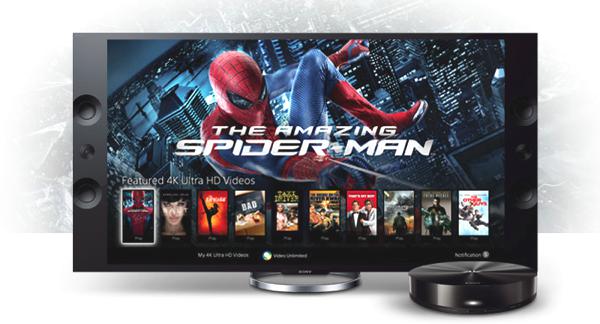 Thought not new, it’s been recently brought to the attention of CNET that 4K media by Sony is proprietary to the company’s television sets. While consumers are free to purchase 4K Blu-ray discs and play them back via any compatible 4K player and 4K television sets, 4K streaming is something entirely different. Set to be released later this month, the Sony 4K Ultra HD Media Player (FMP-X10) is capable of tapping into Sony’s growing line of 4K content (as well as Netflix with shows like House of Cards), thanks to Video Unlimited and stream 4K content. The issue is that if you own a Samsung or LG 4K television, the two devices won’t work together. The debate goes that this move by Sony is hurting 4K growth but is it really true? It’s worth mentioning that Samsung has a similar device which is equally locked to their line of televisions.
Thought not new, it’s been recently brought to the attention of CNET that 4K media by Sony is proprietary to the company’s television sets. While consumers are free to purchase 4K Blu-ray discs and play them back via any compatible 4K player and 4K television sets, 4K streaming is something entirely different. Set to be released later this month, the Sony 4K Ultra HD Media Player (FMP-X10) is capable of tapping into Sony’s growing line of 4K content (as well as Netflix with shows like House of Cards), thanks to Video Unlimited and stream 4K content. The issue is that if you own a Samsung or LG 4K television, the two devices won’t work together. The debate goes that this move by Sony is hurting 4K growth but is it really true? It’s worth mentioning that Samsung has a similar device which is equally locked to their line of televisions.
So let’s talk after the jump.
The idea presented by Geoffrey Morrison from CNET is that if Sony allowed the FMP-X10 to be compatible with other manufacturers’ televisions, consumers would be more willing to purchase 4K. He rightly points out that consumer adoption of previous technologies like DVD (and Blu-ray) would be drastically different if there wasn’t cross brand compatibility between discs, players, and televisions. When Sony was contacted on the matter, Sony claimed that their devices were locked to one another due to piracy concerns. While this may be one of the reasons, I believe it’s not the core mentality.
Currently, Sony leads in 4K adoption and 4K sales, followed by Samsung. In the last 2 years since the inception of 4K, we’ve already seen prices drop dramatically and this likely will continue. In fact, there have been announcements of 4K televisions near the $1,000 market. While I won’t dive into the argument of how cheap brands like Vizio and others destroyed the television industry and are likely set to do the same thing with 4K, what I will point out is this: If Sony is going to stay in the 4K television market, they’ve surely calculated that cheap 4K sets will eventually flood the market as they did with HD.
With that as the backdrop, Sony is then faced with two decisions; either also produce cheap sets in order to fight off competitors or continue to make better products, knowing that their marketshare will decrease. With Sony claiming that they’re not interested in marketshare and instead want to focus on profitability, the company’s strategy is clear. However, unlike Vizio and even Samsung, Sony has one key asset that can help fend off its competitors: Sony Pictures.
While a good 4K television will be able to up convert HD footage to 4K (something that cheaper 4K sets won’t be able to do or do well), nothing will be able to replicate native 4K content. With Sony Pictures and other media assets, Sony has been able to move its massive film production might behind 4K and produce native 4K content. The Sony FMP-X10 then taps into that content and in turn, gives Sony’s 4K fleet of television something Samsung and others cannot match which is exclusive 4K content like American Hustle, The Amazing Spider-Man, (and soon the awesome The Amazing Spider-Man 2) and TV shows like The Blacklist and Breaking Bad.
While this may seem like a bad move on Sony’s part, the likelihood is that it doesn’t hurt the company or 4K adoption. Consumers aren’t pouring into their local electronic store to purchase 4K sets. Those that are purchasing 4K are likely aware of the extra cost of content (i.e. movie rental from Video Unlimited runs at $7.99 while full purchase sets you back $29.99), and are looking for an end-t0-end solution which will involve purchasing a compatible device like the FMP-X10. Unlike Blu-ray where you may have purchased your HD set at Best Buy and you stumbled upon a Blu-ray player at Target, 4K is still for the early adopters.
Sony currently has more incentive to make their 4K sets as attractive as possible to consumers, versus opening up the X10 to competitors for the smaller return they’d make on selling those devices and its content. In fact, by Sony keeping their systems tightly integrated, they can create an end-to-end experience for consumers. If the X10 was compatible on an LG 4K set, Sony cannot ensure the entire experience and in fact can hurt the adoption of 4K, due to a subpar experience that may have been out of Sony’s control.
Make no mistake: as 4K adoption grows, Sony will likely open their content and media streamers to every manufacturer as it will be a great source of income (with mass adoption) for their electronics and film divisions. Until that time, there is little reason for Sony to give up their ace in the format as 4K has yet to hit mainstream.
Discuss:
Do you think locking up 4K is currently hurting the format or does it make more sense for Sony to currently keep their 4K content exclusive?
[Via Cnet]
